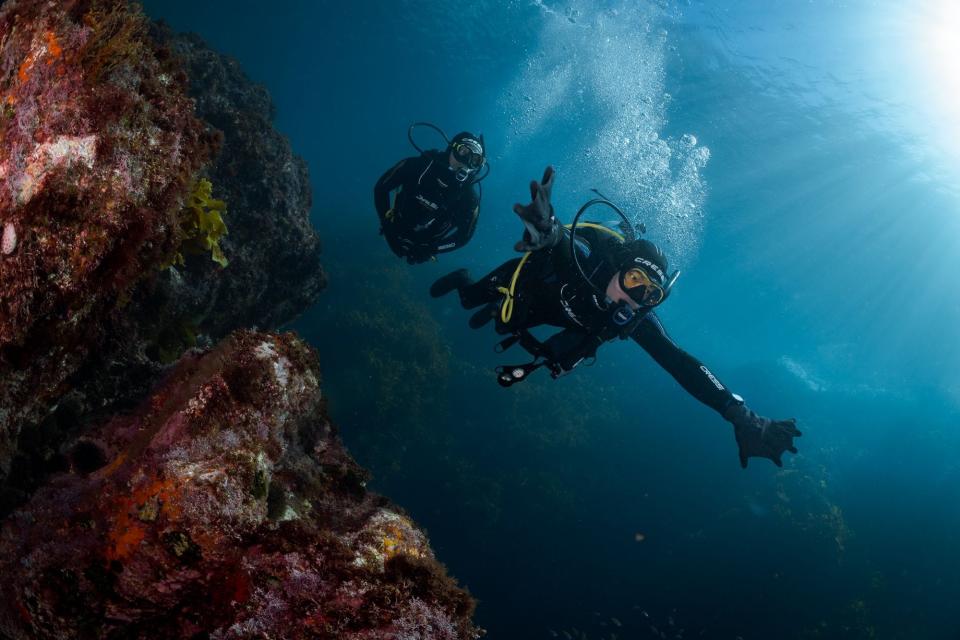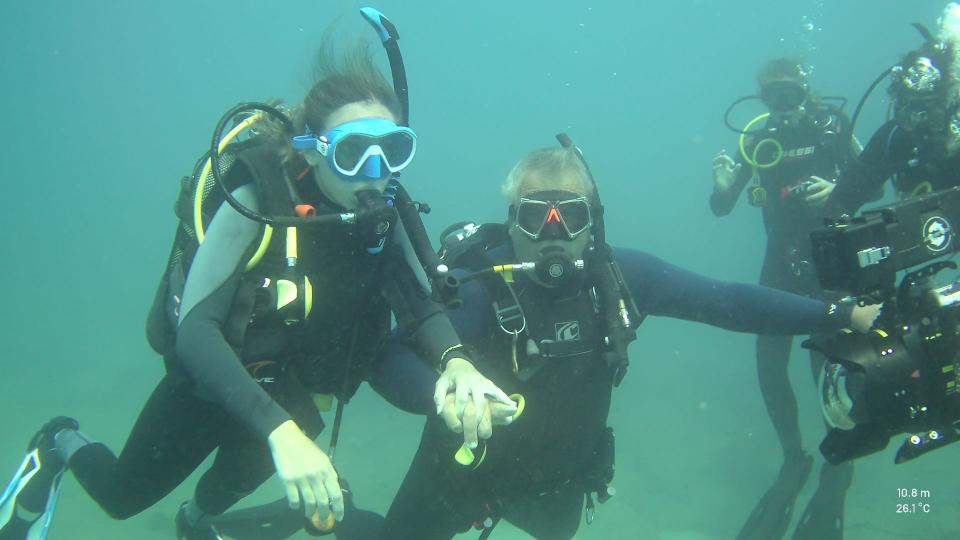Are there blind scuba divers? Here's the accessible way anyone can explore the ocean.
“Accessible Travel” is a six-part series focusing on the travel industry’s preparedness to welcome travelers with disabilities. If you'd like to contribute to our future reporting and share your experience as a source, you can click here to fill out this quick form.
When Jessica Pita and her dive buddy started their descent into the water off the coast of Mozambique this past March, her companion started humming the infamous tune to “Jaws.”
Pita instantly got the message: a shark. Without hearing that tune, she had no other way of knowing a five-meter-long shark was right underneath the two divers.
The South Africa-based diver has been legally blind since she was a teenager. At 11, Pita underwent brain surgery to remove a tumor, but the procedure left permanent damage to her optic nerves. She emerged from the surgery without the tumor and the majority of her vision.
Pita’s central vision is completely black but she sees “pinpricks of light, almost like stars,” she told USA TODAY. The outer parts of her eyes are extremely blurry, and she lacks depth perception. “Everything just fades into everything else.”

That doesn’t stop Pita, now 21, from being an avid scuba diver – typically thought of as a “seen activity,” where people are able to witness the vibrancy of life below the water’s surface.
In fact, scuba diving is one of the rare chances Pita has to relax and get a break from everyday life.
“Going scuba diving, you get that peace and quiet – especially for me, where I rely on all my senses on a day-to-day basis to navigate where I am,” she said. When Pita’s diving, she can just go with the flow of being underwater and not have to constantly map out different places in her brain or worry about what's in front of her, she said. (Having a dive buddy, which is standard procedure for all divers, helps.)
Although Pita cannot see the fish or coral, her senses remain highly engaged. She can feel the movement of their wagging fins and tails. She can hear the crackling of the coral and feel the different types of sand and the weightlessness of the water around her.
With its intensive gear, such as heavy air tanks and fins, and the challenges of navigating the underwater world, most people wouldn’t think of scuba diving as an easily adaptive sport. However, just about anyone with physical and mental disabilities can still explore the ocean through diving – and reap its healing benefits.
'If I can do this, I can do anything': How this Tahoe nonprofit empowers travelers with disabilities
From good-for-you minerals and vitamins in salt water like magnesium and potassium to the buoyancy and joint relief of moving underwater, scuba diving offers an array of health benefits for people’s physical and mental wellbeing.
“It’s a sport that allows you not only to heal (physically) but mentally as well. It gives you that feeling that you’re capable of anything,” Julie Andersen, PADI’s Senior Director of Brand, told USA TODAY. The Professional Association of Diving Instructors is the world’s most recognized diving organization, with over 29 million certifications.
Opening the ocean to everyone
Scuba diving offers therapeutic benefits by immersing individuals in an underwater environment. Las Vegas-based Ryan Chen was 19 when he suffered a snowboarding accident at Big Bear, California, in 2008 that left him paralyzed from the waist down. An athlete his entire life, he sought out new hobbies and sports that could be adapted to his new capabilities. He discovered scuba diving in 2013 and has been hooked ever since.
Chen typically experiences back pain and pins and needles at the site of his injury, but when he is diving, the pain goes away. Focusing on his breathing and feeling the weightlessness of the water gives him physical relief but also makes him feel more confident.
“You’re very free, you’re completely buoyant,” Chen, who co-founded a functional chewing gum company called Neuro that also promotes ocean conservation in partnership with PADI, said.
Disney World with a wheelchair? Here’s how DVC made our trip easier and more fun
Chen and his dive buddy, Neuro co-founder Kent Yoshimura, have since dived in New Zealand, Catalina Island in California, Mexico, and, soon, Costa Rica.
According to a 2021 study, scuba diving was found to help people with physical disabilities build their self-esteem, improve their motor skills, and decrease pain. Being underwater relaxes the muscles and increases the joint range of motion.
There are several organizations that use the healing power of scuba diving, such as Patriots for Disabled Divers, which introduces the activity to people with PTSD, autism and other disabilities. The organization offers veterans the chance to learn to dive at no cost.
Intrinsically an adaptive sport, PADI has long-welcomed divers from all paths of life, and that’s been spearheaded by Fraser Bathgate, the first wheelchair PADI pro-diver, since the 1990s. Chen said he was surprised over a decade ago when he first started diving by how easy and accessible the activity was for him.

“You forget about any type of disability you may have on land,” Chen said.
Since 2017, PADI has offered two courses on adaptive technique specialties. In 2022, PADI widened its adaptive diving program even more, opening it to anyone wanting to learn how to become a dive buddy for adaptive divers. Now, there are more than 2,000 dive buddies who are trained to help those with various disabilities.
There are also 40 adaptive service facilities worldwide – in places like San Diego, Maui, Australia and Italy – that have invested in infrastructure to help divers with physical or mental challenges, such as accessible pools or boat decks with lifting nets. The number of accessible facilities is only growing, Andersen said.
Dive equipment can also be easily adapted based on the individual’s skill set and capabilities. Chen uses webbed gloves to help propel him in the water. Amputees can use adaptive scuba fins that strap above the knee. Full-face masks can also make people more comfortable breathing in the water. Sometimes, the only adjustment needed is switching the regulator hoses to the other side of the body.
For divers with hearing impairments, the communication process is nearly the same since scuba divers use hand signals or write on their slate underwater. (Although some hand signals in diving can be considered offensive in American Sign Language.)
“I think the world is catching on that it’s no longer nice to have (to make) things accessible, it’s critical,” said Andersen. “And for us in our sports, it’s even more so. We feel so passionate about the potential of diving in the ocean.”
Jessica Pita’s journey

Although she’s always loved the ocean, Pita never thought she’d be a scuba diver after her surgery. “To go and see the corals and fish, having my disability, it was…never on my list,” she said.
Last November, an old friend of her mom’s reached out, saying a dive school was looking for someone with a disability to help kick-start its adaptive diving program. Since Pita was on a semester break at university, she decided to try it out because it sounded “like an adventure.”
“After that, I was like, wow, what have I been missing?” Pita said. “It was insane. So many things were happening in my brain. Everything was so calm at the same time. Just the feeling of being underwater and breathing through the regulator… It’s just a feeling you don’t get, it’s very hard to explain.”
When she dives, Pita holds hands with her dive buddy, who signs directly onto her hand. Her buddy will squeeze her hand to ask if she’s okay, and she signs the normal “OK” back. Different types of fish call for different signals, like if there’s a starfish, they’ll draw a star on her hand. Sometimes the conditions are difficult for her to navigate, like if there’s a strong current.
“Scuba diving was never a thing I was interested in, but now it’s something I cannot live without,” Pita said. In the four or so months since she became PADI-certified, Pita has been on over 20 dives and is now a PADI ambassador, spreading awareness of “being able to do things for myself in a sport that's usually seen as a seen sport brings independence and empowerment to yourself.”
Have you, or someone you know, had issues with accessibility while traveling? What happened?
Kathleen Wong is a travel reporter for USA TODAY based in Hawaii. You can reach her at [email protected].
This article originally appeared on USA TODAY: How scuba diving makes the ocean accessible to everyone
